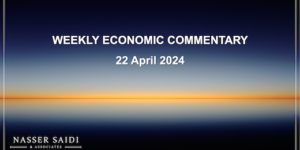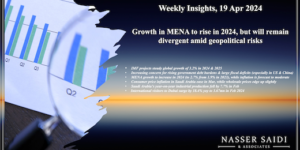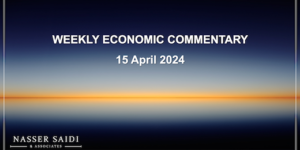Markets
China’s equity market plunged 6.2% overnight on Friday in a lagged reaction to the data released on Thursday pointing to strong growth, but higher inflation. The markets are anticipating Chinese monetary tightening. In fact all other markets, except Japan, ended the week with substantial losses. This episode confirms that Chinese contribution to world liquidity, which is likely to be further squeezed, is a key factor in global equities. The dollar rebounded sharply bringing down gold prices. Energy commodities were generally weaker.
Global Developments
Americas:
- US initial jobless claims fell by 24k to 435k for the week ending Nov 6 while the four-week moving average stood at 446.5k.
Europe:
- Euro Area GDP slowed to 1.6% qoq, sa, annualized in Q3, with important divergences (Germany up 2.8%; France 1.6%; Spain flat; and Greece down 4.5%). German GDP was up 0.7% qoq in Q3 after +2.3% in Q2 a bit softer than consensus (+0.8%qoq). The Statistical Office hinted that investment and net trade contributed equally to growth in Q3. German recovery is losing momentum. A host of industrial production data from the Eurozone countries – German production fell by 0.8% mom in Sep, driven by a 0.9% fall in the manufacturing sector; France recorded a 0.1% rise while Italian IP fell 0.2%, the most in 18 months.Euro Area IP plunged 0.9%m/m in Sep to the level it stood at in May. The inventory rebound is now over and Europe will find itself looking at materially weaker cyclical data in coming months.Yields on Irish Government Bonds soared until a Joint Statement by EU finance Ministers calmed market pressures temporarily. The pressure is likely to extend to other highly indebted countries. A bailout from the European Financial Stability Fund (EFSF) for Ireland appears likely.
Asia and Pacific:
- China trade surplus posted a larger-than-expected USD 27.1bn in Oct (Sep: USD 16.9bn) as exports rose 22.9% yoy while imports into China increased by 25.3% over the same period. China CPI rose to 4.4% in Oct (Sep: 3.6%) on a sharp increase in food prices while retail sales printed a 18.6% yoy rise to CNY 1.83 trillion in Oct, taking the cumulative retail sales in the first 10 months to CNY 12.53 trillion (+18.3%). Meanwhile, industrial production clocked a 13.1% yoy gain in Oct, slightly slower than Sep’s 13.3%, taking the growth in the first 10 months of the year to 16.1%. Hong Kong Q3 GDP grew 6.8% yoy, after growing 6.5% yoy in Q2, higher than consensus expectation of 6.1% yoy. On a sequential basis, GDP increased 2.8% qoq; (ann.), the sixth quarter of positive growth.Singapore’s exporters are facing higher inventories amid signs of weaker demand.
Bottom line:
The data flow brought very few surprises in a week where the attention was concentrated on the G20 meeting in. Korea. But even there news was rather scant as a truce on the currency war proved elusive. Currency issues had divided G20 leaders ahead of the November 10-12, 2010, meeting in Seoul, and at its end, as expected, little was resolved. Leaders reiterated a prior pledge to move toward market-determined exchange rates, without directly pointing a finger at China. Also, rather than agree on targets for current account imbalances, member nations agreed to set out “indicative guidelines” to measure imbalances—the details of which are to be worked out at a future date, likely in 2011.
Regional Developments
- The signs of a pick-up in inflation in the GCC might warrant an early withdrawal of stimulus as early as 2011, according to a senior IMF official.
- Oman has reported a 12.6% yoy rise in the total assets of commercial banks to OMR 15.7bn by Sep 2010 while the total outstanding credit moved up 9.9% to OMR 10.6bn.
- The GCC Customs Union officials have agreed on establishing an electronic clearing mechanism for settling customs duties between the GCC states, but are facing “administrative” hurdles before the union can be fully implemented. The ministers also discussed a Bahraini proposal to set up a pan-GCC fund for financial and economic stability and a Qatari proposal to establish a regional development bank.
- The GCC Secretary-General announced that the Gulf Monetary Union is not achievable without the participation of the UAE at the sidelines of a conference titled “Gulf Common Market: from Cooperation to Integration” in Dubai.
UAE Focus
- The UAE cabinet has approved a draft budget of AED 41bn for fiscal year 2011, with the three year spending for the budget cycle 2011-2013 at AED 122bn. The 2011 budget focuses on social development with 46% of the total allocations covering public and higher education sectors, university development, health, salaries, pensions and social benefits.
- Abu Dhabi’s nominal GDP slumped by around 18% yoy to AED 546.5bn in 2009 from AED 666.7bn in 2008, with the largest decline recorded by the oil and gas sector, which shrank by 33.5% in 2009 (2008: 32%). Meanwhile, the non-oil GDP grew by 6%.
- The UAE Central bank’s total assets shrank by close to AED 212.03bn during August (July: AED 214.3bn), but was higher compared to AED 203.9bn at the end of 2009.
- The latest CB report also showed that banks cut their utilization of the AED 50bn emergency funding facility, with the funds owed by the banks under the facility at AED 1.87bn at the end of Aug compared to AED 4.5bn at the end of 2008.





